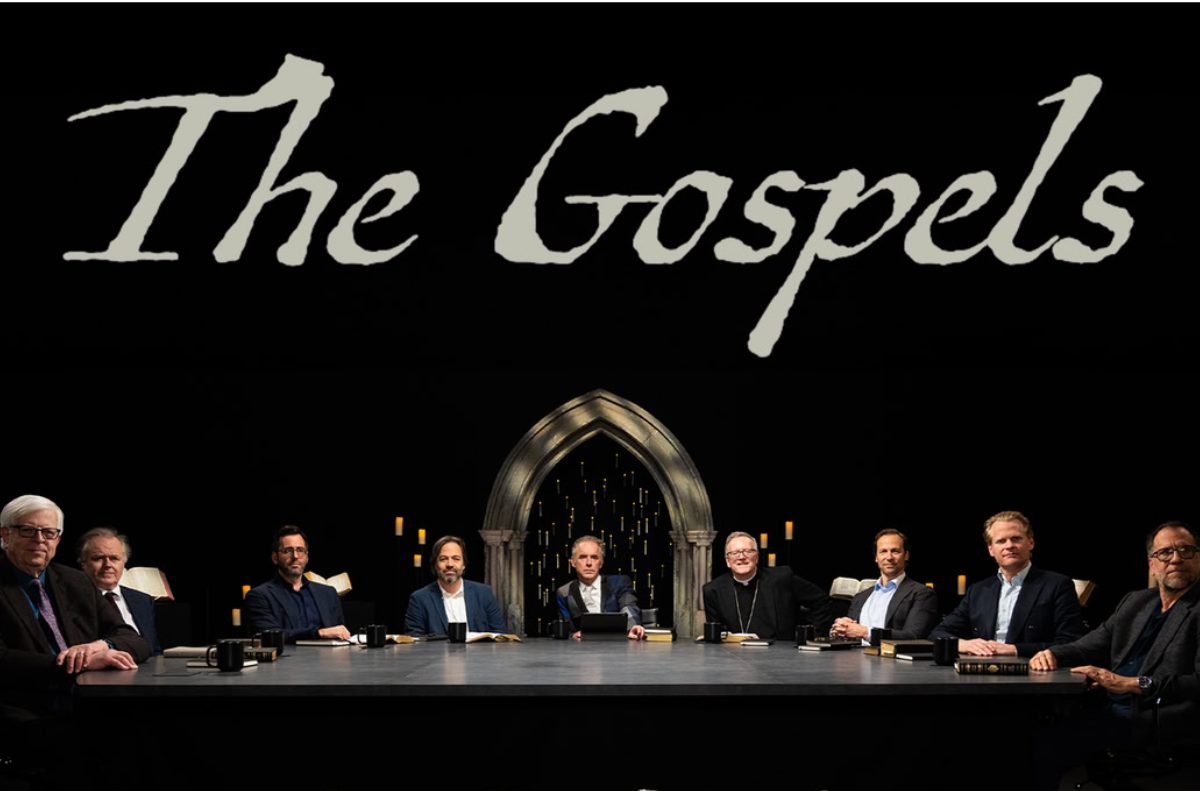Last Sunday, DailyWire+ premiered the first two episodes of Jordan Peterson’s ten-part series, The Gospels. It’s a follow-up to their Exodus series from 2022. DailyWire+ describes the series as:
“A part of his lifelong effort to rescue society from the meaning crisis that seeks to devour our culture, Peterson gathers nine of the world’s most brilliant minds to unravel the mysteries of the Gospel story and to resurrect the anchoring principles of the text that formed the West.”
The series features scholars such as a Catholic bishop—Robert Barron, an Eastern Orthodox liturgical artist and speaker—Jonathan Pageau, an Anglican philosopher—Dr. James Orr, and a religious Jew—Dennis Prager.
The series begins with Jordan Peterson reading verses from the first chapter of the Gospel of John. I immediately noticed something strange about the Bible translation he was reading. I wasn’t familiar with it, but it didn’t sound like any traditional Bible translations. Peterson explained later that he was reading from a translation called The Single Gospel by a writer named Neil Averitt.
The Single Gospel adds all four gospels into one supposedly cohesive story. Since the four gospels often share accounts of the same events—like the crucifixion of Jesus Christ—Averitt omits many words from the Gospels to create a chronological story. So it’s crucial to understand that The Single Gospel isn’t the Bible. It’s an interpretation of the Bible, not a translation.
Therefore, in some sections of the book, he replaces the Word of God with false teaching. For instance, the ESV translation of John 1:18 is, “No one has ever seen God; the only God, who is at the Father’s side, he has made him known.” But The Single Gospel’s translation says:
“No one has seen God at any time; but the only Son, who is closest to the Father’s heart, has made him known to us.”
That mistranslation fundamentally changes what we know about Jesus and the Gospels. The ESV translation, like all faithful translations, suggests Jesus is God. It implies, as Jesus says in John 10:30: “I and the Father are one.” Averitt’s “translation,” however, implies Jesus isn’t God. It suggests Jesus is merely the closest being to God. That is heresy. Averitt essentially admits this in his description of the book: “These kinds of judgments mean, of course, that the present work is no longer a holy text.”
Instead of letting God speak for himself, he tries to improve on God’s word, which is fitting, since the same can be said for the series.
I’ve watched the first two episodes, and they cover the meaning of the Word in John 1, Jesus’ baptism and temptation, Jesus turning water into wine, and Jesus’ words to Nicodemus about what it means to be born-again. However, no one on the panel offered a Biblical view on these topics. It’s disappointing, though not surprising, that Peterson’s The Gospel series offers no gospel.
I love Jordan Peterson. He’s a fellow Canadian I’ve admired for a decade. I had the honour of talking to him by email not long after I started this blog, and he was incredibly humble and kind. He is one of Canada’s greatest exports. However, I’m sad to say that although he’s helpful on culture, he’s a heretic on theology.
The message from the scholars in this series appears to be that Christianity is better than secularism. Dennis Prager communicates that effectively when he says: “the death of Christianity is my nightmare.” Then quoting a poet, he said, “When people stop believing in God, they don’t believe in nothing. They believe in anything.”
But secularism isn’t the only problem. It isn’t even the biggest problem. False interpretations of the Bible are the biggest problem. The road to secularism is paved by false interpretations of the Bible.
Secularism says society doesn’t need God. Jordan Peterson similarly insinuates that individuals do not need to repent and believe in Christ. They seem to suggest that cultural Christianity is sufficient. But as the 20th century in the West shows, cultural Christianity without repentance and faith in Christ inevitably leads to secularism.
Peterson and the rest of the scholars seem to suggest authorial intent in the Gospels is irrelevant. Peterson’s classic Jungian, psychoanalytical interpretation of scripture isn’t too far off from how postmodernists interpret scripture. His understanding of scripture suggests there are possibly multiple meanings to the Gospels. His self-help approach is similar to how modernist theologians in past centuries interpreted scripture, which evolved to postmodernism and secularism.
So as much as Peterson hates postmodernism, his refusal to submit a narrow interpretation of the Bible could lead others to the wide gate of postmodernism, not Christ.
But that doesn’t mean this series isn’t worth your attention. I’m glad DailyWire+ is producing this type of content. I think it can be a valuable resource. I’m always curious about what an ecumenical group of people have to say about Jesus. I wouldn’t recommend this to vulnerable, immature believers, but if you’re a mature believer, you might find this series as fascinating as I do. If you are a parent with a mature high school or college student, watching this series with them could lead to great conversations.
I have a friend named Matthew Johnston who pastors at Riverbend Bible Church in New Zealand. We recently talked about Christless conservatism on his No Lasting City podcast, and he shared that a young man has been attending his church because of Jordan Peterson’s lectures on the Bible. Matthew says he’s been spending time with that young man to help him embrace real, Biblical Christianity.
So although Jordan Peterson isn’t a Biblical thinker, he is attracting some young people to church. I’m grateful for that example of God’s grace.
I’m glad DailyWire knows conservatism can’t survive without Christianity. However, Christianity doesn’t mean anything without Christ. Cultural Christianity is more useful than secularism, but it’s just a placeholder. Only the true gospel of Jesus Christ creates real, lasting change.
So as fascinating as The Gospel series, it’s missing a Carl Trueman type.
Also, since DailyWire+’s description of the series says: “Peterson gathers nine of the world’s most brilliant minds to unravel the mysteries of the Gospel story,” perhaps I should mention the obvious: I am not a brilliant mind.
I am not a scholar. I do not have a PhD, a master’s degree, or even a Bachelor’s degree. I am a high school dropout. And yet, I understand the gospel better than all of the brilliant minds in the series.
That doesn’t mean I’m smarter than Jordan Peterson and Dennis Prager, not even close. It just means that the gospel just isn’t complex enough for them; it’s too simple for them. It means what Paul says in 1 Corinthians 3:18-20 is true:
“Let no one deceive himself. If anyone among you thinks that he is wise in this age, let him become a fool that he may become wise. For the wisdom of this world is folly with God. For it is written, ‘He catches the wise in their craftiness,’ and again, “The Lord knows the thoughts of the wise, that they are futile.”

